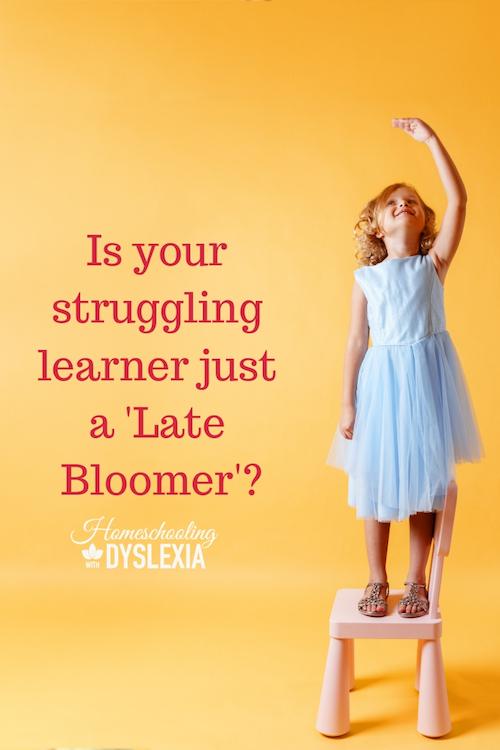Have you ever been told that your struggling learner may just be a late bloomer? While that is a comforting thought and takes some pressure off of us, it is a common misconception with serious consequences.

My boys started annual testing with their educational therapist this week.
So far it is looking like they have made some significant progress this year. I have not heard those words or anything even close to those words – progress, grade level, impressive – in relation to my boys’ learning since we started homeschooling them.
As I watched them play at the pool this week, I got to thinking.
Are they late bloomers or struggling learners?
They are 8 and 11 years old. They are both well on their way to becoming readers. They read (at their level) for pleasure without being asked. They are mostly happy (except for the usual sibling clashes).
So why all the fuss to ‘get them reading’? Maybe they were just late bloomers! Maybe I could have avoided all the expensive tutoring, programs, and therapies and simply let them play Legos and bounce on the trampoline and they would still have learned to read in their own time.
So aren’t they just late bloomers?
Yes and no.
Yes they are late bloomers in the sense that they are learning on a completely different trajectory than traditional learners who don’t need to work around slow processing speeds, weak working memory, and poor executive function. Their reading skills are ‘blooming’ now in 3rd and 6th grade in the way that most kids would be in 1st-3rd grade.
But no, they are not late bloomers inn the sense of just wait and see how they do. They’ll get it eventually – when they’re ready.
Neither perspective is the whole story.
But the most beautiful thing about homeschooling our wonderful kids is:
- they can receive the kinds of instruction they need (1st grade level reading in 3rd grade or whatever) and
- progress at their own pace WITHOUT the pressure to keep up.
The difference between a late bloomer and a struggling learner.
Our kids with learning struggles learn at a different pace. BUT, they need to be taught. Waiting is not the key. Just as you wouldn’t wait for a seed to sprout without watering it, you should not expect your kids with dyslexia to learn to read without being taught.

Research shows the powerful effects of early intervention with struggling learners. In fact one of the main tenets of the Orton-Gillingham reading approach is that everything needs to be taught explicitly – nothing is left to chance. For many of our kids, reading doesn’t ‘click’ one day as it often does for traditional learners.
Simple ways to help your struggling learner.
No pressure. You must understand that most kids want to do well. Teach them at their level but allow them the freedom to learn and grow at their pace. If you are anxious about their progress visit our Facebook page or find another dyslexia support system to share your concerns. Don’t pressure your kids. Anxious kids can’t learn.
Be consistent. I often hear from parents who say that their child isn’t learning with a particular Orton-Gillingham reading program. They are thinking of switching programs and hit the forums looking for feedback. Everyone has a favorite reading curriculum. Honestly, the best reading curriculum is the one you use. If you donn’t like a curriculum or your child resists using a particular program, go ahead and switch but remember, any program, used faithfully will work.
Related Post: Comparison Guide of the Top 4 Reading Curriculum for Dyslexia
Read aloud. Reading aloud (or listening to good quality audio books) should be a part of everyday. Readings good books improves vocabulary, knowledge of complex sentence structures, teaches history, geography, and character, and helps kids learn to love books and story even if they aren’t able to read the books on their own yet.
The effects of waiting to teach reading.
Of our 7 kids with dyslexia, they have all learned to read at different ages. Our older kids who didn’t have the benefit of my current knowledge about dyslexia learned to read later.
They spent a lot of years struggling and losing confidence (yes, even though we were homeschooling). Even now, one of our oldest kids is still a terrible speller!
Related Article: Help for the Older Struggling Reader
Over the years we have gone from a wait and see approach (the late bloomer theory) to a more proactive approach, choosing to teach them with methods that have been proven to work, building a foundation from an early age.
In my experience, choosing early intervention WITH the knowledge that all kids learn and develop on their own unique timetable has been the best way to both give them the tools they need to learn to read while giving them the freedom to learn and grow at their own pace.



